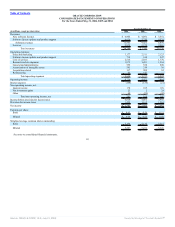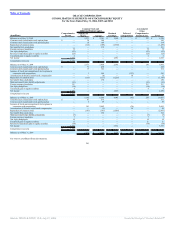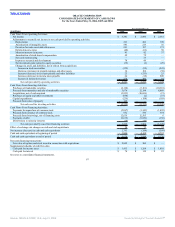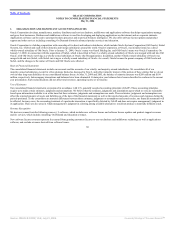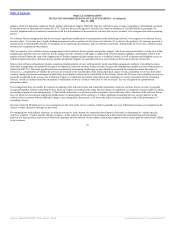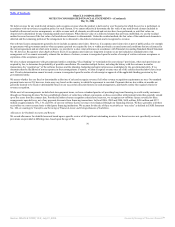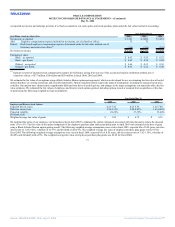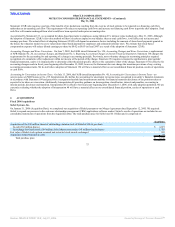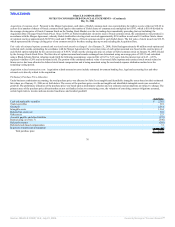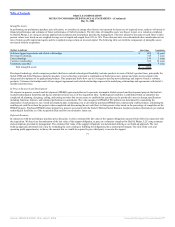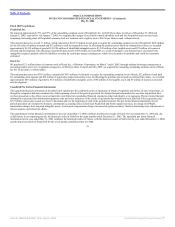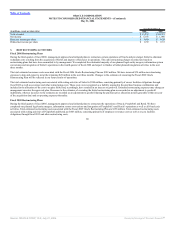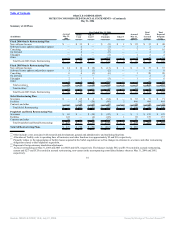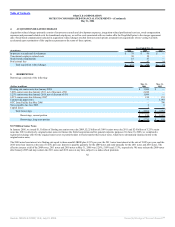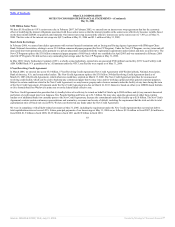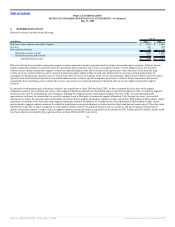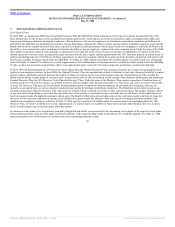Oracle 2005 Annual Report Download - page 78
Download and view the complete annual report
Please find page 78 of the 2005 Oracle annual report below. You can navigate through the pages in the report by either clicking on the pages listed below, or by using the keyword search tool below to find specific information within the annual report.
Table of Contents
ORACLE CORPORATION
NOTES TO CONSOLIDATED FINANCIAL STATEMENTS—(Continued)
May 31, 2006
Statement 123(R) also requires a portion of the benefits of tax deductions resulting from the exercise of stock options to be reported as a financing cash flow,
rather than as an operating cash flow. This requirement will reduce net operating cash flows and increase net financing cash flows in periods after adoption. Total
cash flow will remain unchanged from what would have been reported under prior accounting rules.
As permitted by Statement 123, we accounted for share-based payments to employees using Opinion 25’s intrinsic value method up to May 31, 2006. Although
the adoption of Statement 123(R)’s fair value method will have no adverse impact on our balance sheet or total cash flows, it will affect our net income and
earnings per share. The actual effects of adopting Statement 123(R) will depend on numerous factors including the amounts of share-based payments granted in
the future, the valuation model we use to value future share-based payments to employees and estimated forfeiture rates. We estimate that stock-based
compensation expense will reduce diluted earnings per share by $0.02 to $0.03 in fiscal 2007 as a result of the adoption of Statement 123(R).
Accounting Changes and Error Corrections: On June 7, 2005, the FASB issued Statement No. 154, Accounting Changes and Error Corrections, a replacement
of APB Opinion No. 20, Accounting Changes, and Statement No. 3, Reporting Accounting Changes in Interim Financial Statements. Statement 154 changes the
requirements for the accounting for and reporting of a change in accounting principle. Previously, most voluntary changes in accounting principles required
recognition of a cumulative effect adjustment within net income of the period of the change. Statement 154 requires retrospective application to prior periods’
financial statements, unless it is impracticable to determine either the period-specific effects or the cumulative effect of the change. Statement 154 is effective for
accounting changes made in fiscal years beginning after December 15, 2005; however, the Statement does not change the transition provisions of any existing
accounting pronouncements. We do not believe adoption of Statement 154 will have a material effect on our consolidated financial position, results of operations
or cash flows.
Accounting for Uncertainty in Income Taxes: On July 13, 2006, the FASB issued Interpretation No. 48, Accounting for Uncertainty in Income Taxes—an
interpretation of FASB Statement No. 109. Interpretation 48 clarifies the accounting for uncertainty in income taxes recognized in an entity’s financial statements
in accordance with Statement 109 and prescribes a recognition threshold and measurement attribute for financial statement disclosure of tax positions taken or
expected to be taken on a tax return. Additionally, Interpretation 48 provides guidance on derecognition, classification, interest and penalties, accounting in
interim periods, disclosure and transition. Interpretation 48 is effective for fiscal years beginning after December 15, 2006, with early adoption permitted. We are
currently evaluating whether the adoption of Interpretation 48 will have a material effect on our consolidated financial position, results of operations or cash
flows.
2. ACQUISITIONS
Fiscal 2006 Acquisitions
Siebel Systems, Inc.
On January 31, 2006 (Acquisition Date), we completed our acquisition of Siebel pursuant to our Merger Agreement dated September 12, 2005. We acquired
Siebel to expand our presence in the customer relationship management (CRM) applications software market. Siebel’s results of operations are included in our
consolidated statements of operations from the Acquisition Date. The total purchase price for Siebel was $6.1 billion and is comprised of:
(in millions)
Acquisition of the 546 million shares of outstanding common stock of Siebel at $10.66 per share:
In cash (382 million shares) $ 4,073
In exchange for Oracle stock (164 million Siebel shares converted to 141 million Oracle shares) 1,763
Fair value of Siebel stock options assumed and restricted stock awards exchanged 245
Acquisition related transaction costs 49
Total purchase price $ 6,130
75
Source: ORACLE CORP, 10-K, July 21, 2006 Powered by Morningstar® Document Research℠


